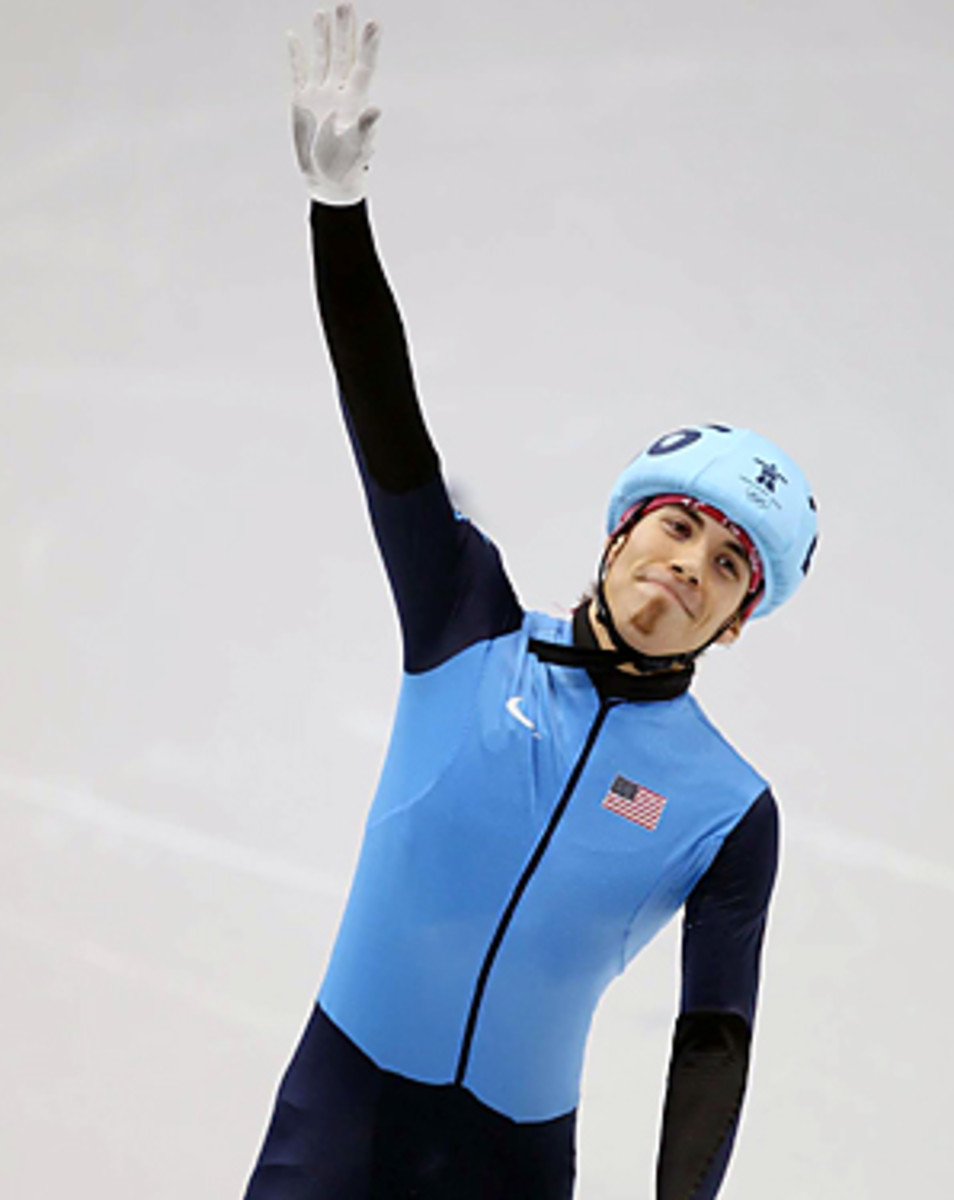Medal has Ohno in Seventh Heaven
Throughout the run-up to the Games, Ohno has been saying that his hard training and slimmer physique -- he has gone from 159 pounds to 144 since the last Olympics -- would allow him to pass people more quickly and avoid trouble in the close confines of his frantic sport.
He proved it for the second time in a week Saturday, with some thrilling racing, when he needed his superb skills to bail him out of trouble -- twice. In the semifinals, he was again behind a pack and initially tried to pass on the outside. Then, seeing that alley closed off, he made a quick improvisation and passed two skaters instead on the inside, pulling himself up to second place. Only the top two skaters advanced into the finals.
In the final, Ohno spent much of the race lodged between the two Koreans, up in the front, and the Canadians behind him. After darting into second place, he slipped during a turn, and fell back to fifth (and last) place, all while trying to regain some sort of acceleration that would allow him back in the chase with just 2½ laps remaining. In the final lap, Ohno darted past the two Canadians to gain himself a spot on the podium. "With two-and-a-half to go, I thought the race was mine," Ohno said after the race. "Short track is very unpredictable. I slipped and went from second to last in the blink of an eye. I had to regroup mentally to win that medal. I can't wait to watch the tape afterwards to see how I managed to work my way back up ... I just didn't give up, because I've seen too many strange things happen in short track. A lot of things can change in those last few strides before the finish."
The daring dash called to mind the 1,500-meter final a week earlier in which Koreans Lee Ho-suk and Sung Si-bak, skating in front of Ohno, took each other out of certain medal position, allowing him to slide into the silver-medal slot. That gave Ohno a share of the U.S. record with Blair, who graciously gave Ohno his just congratulations after the race last night. "I'm very happy for Apolo's accomplishment," Blair said. "It's a great feat for him, U.S. speedskating, and the United States of America. We hope that more kids will see his accomplishments and want to try our great sport that has been so good to us and taught us so much about what it takes to be successful in life."
In three Olympics, Blair won five gold medals and a bronze. In his three Games, Ohno has now amassed two golds, two silvers and three bronzes. In Vancouver, he still has to skate the 500 meters and the 5,000-meter relay, a race in which the U.S. team has already qualified for the final with the Koreans, Chinese and Canadians.
Asked after the race if he planned a loud celebration, Ohno, simply shook his head and rubbed his eyes. "I can't be like the snowboarders -- just going out and celebrating now," he said. "Tomorrow, I have to get back to work. I've been celebrating internally by competing. I truly love what I do. I've poured everything I have into these Olympic Games. Every day I'm here I feel like I'm celebrating. Maybe that's why I'm happy all the time."
Ohno gave a quick thanks to his support staff, primarily his chief coach, Jimmy Jang, and his father, Yuki. "You guys only see me out there competing," he said, "but there are so many other people behind me, supporting my quest and supporting Team USA." Until recently, when Ohno posted a photo of himself with the U.S. flag behind him, His Facebook ID photo featured the two Ohnos together in front of a body of water. Yuki was the one in the foreground.
It was his father, a Seattle hairdresser, who talked to him about coming full-circle to Vancouver, where he used to compete as a young teen, to finish his career. "If the Games were somewhere else I probably would not have gone another four years," Ohno said. "Why I should drive myself to insanity dissecting an obscure crazy sport that's in Olympic Games? Since I started contemplating this, I've had nothing but green lights. Every day I wake up here I know I've made the right decision."
There is something refreshing about the way Ohno has chased this record, because he hasn't really chased it at all. There is the twitch of challenge, the need for risk and uncertainty that has pushed him when he could have rested on his laurels. It is as if he embraces the rigors of training and the obstacles in a race as a game some feel he cannot win. "As an athlete, I don't look back at the medals," he said. "I look at the struggles it took to get to this point. I can look at them and say, 'I got you.'"





